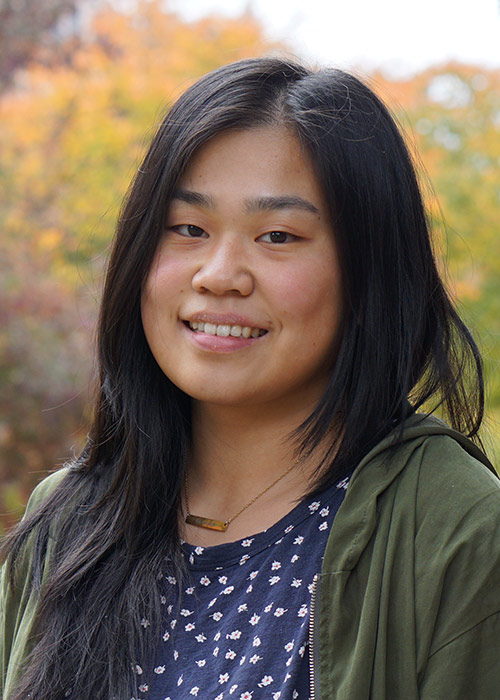
What influenced you to pursue a graduate degree in nutritional sciences?
I became interested in nutrition at an early age. When I was young, my father, an oncologist, would frequently explain to me how fat clogs up arteries, how meats with nitrites could cause cancer, and why fried foods should be avoided. These discussions at home piqued my interest in the food industry, leading me to enter my undergrad at UC Davis as a food science major with the goal of pursuing a career in product development to create healthier food products. After completing several courses and an internship in food science, I became more curious about the nutritional aspect of foods and eventually graduated with degrees in clinical nutrition and design. My time at UC Davis expanded my awareness of the many factors that affect the way we produce, distribute, and consume food. I realized that the nutrition issues we face do not solely stem from the food industry but rather are the product of larger systems that need change. My desire to explore a systems approach to nutrition led me to pursue an MPH in nutrition.
Why did you choose UW?
After speaking to my professors at UC Davis about graduate programs in nutrition, I received high recommendations for the UW Nutritional Sciences Program for the way it prepares students to think and problem solve with an evidence-based and systems approach. Other factors that influenced my decision included my preference for staying on the West Coast and the positive experience I had during my visit to Seattle before coming to UW.
How do you see the importance of nutrition in public health and disease prevention?
With many diet-related chronic diseases being the leading causes of death, public health nutrition plays a huge role in disease prevention. Additionally, since food systems are intricately connected with other social systems, nutrition is a unique space to address social determinants of health and health disparities.
Tell us about a recent project.
Over the summer, I completed fieldwork at the Center for Science in the Public Interest (CSPI), where I designed a research protocol to assess the impact of marketing practices by online grocery retailers in the US on the online food environment. The research will be used to advocate for healthier marketing practices.
Currently, I am collaborating with a group of my classmates on a capstone project with Seattle Fresh Bucks that aims to help the organization understand how they can expand the reach of their produce prescription program. It involves evaluating best practices and potential funding streams for program implementation.
What are your future goals?
I hope to gain more experience in nutrition policy and advocacy and eventually work on public health nutrition at a local or state level. My areas of interest include healthy food environments, food justice, and environmental sustainability.
What do you like to do for fun?
I enjoy playing ultimate frisbee, dabbling in design, and cooking/baking.
Tell us a fun fact about yourself.
I can pick a really good watermelon!
What do you enjoy most about living in Seattle?
Seattle has a lot to offer! I enjoy exploring the cool parks and neighborhoods. Each neighborhood has a unique personality, and my favorite one to visit is Ballard. The food is also decent in Seattle! There are also a lot of cuisines to explore throughout the city, and I enjoy trying out new spots with friends!
What advice would you give prospective students considering the MPH or GCPD program?
For those who are unsure which path (MPH or MS, with or without the GCPD) to pursue within nutritional sciences, I would suggest considering the route that will best serve your goals. As someone who doesn’t plan on doing clinical work in the future, I was initially uncertain about the GCPD path. However, I appreciate having a deeper understanding of the clinical aspect of dietetics through my GCPD courses. Additionally, I’ve learned through conversations with other professionals that the RDN training can open doors to career opportunities, boosts your effectiveness in the realm of nutrition policy, and provides a comprehensive view of dietetics from individual-level care to policy that impacts populations. These advantages ultimately led me to become part of the GCPD.
Are you interested in studying nutritional sciences as a graduate student? Explore programs and RDN training offered in the UW Food Systems, Nutrition, and Health program.